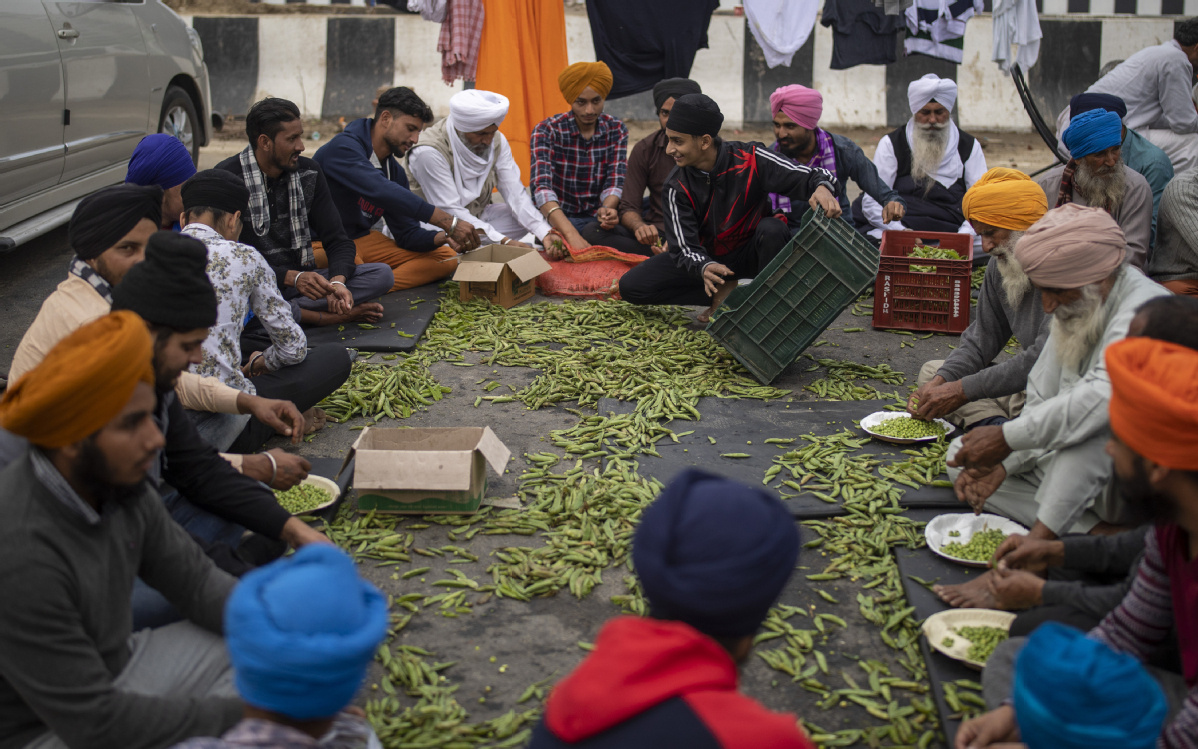
Farmers shell peas for a community kitchen as they block a major highway in a protest against new farm laws near New Delhi on Monday.(Photo: agencies)
The Indian government has proposed to suspend three contentious farm laws for one-and-a-half years in a bid to end a nearly two-month-long protest by tens of thousands of farmers camped outside the national capital.
The proposal, made on Jan 20 at a meeting with protesting farmer unions, together with a suggestion to set up a joint committee to discuss the laws, failed to draw immediate welcome from farmer leaders.
The union representatives said they will revert after internal consultations and discuss with the government in the next round of meeting scheduled for Jan 22.
Nevertheless, the development marks a major breakthrough that could potentially end the prolonged farmers' agitation, said Gopal Krishna Agarwal, a spokesperson for India's ruling Bharatiya Janta Party.
It was tenth round of talks between the Indian government and protesting farmer unions since December. Union agriculture minister Narendra Singh Tomar, railways, commerce and food minister Piyush Goyal, and minister of state for commerce Som Parkash, held talks with the representatives of around 40 farmer unions.
"During discussions, we said that the government is ready to put on hold the farm laws for one or one-and-half year. I'm happy that farmer unions have taken this very seriously and said that they would consider it tomorrow and convey their decision on Jan 22," Tomar said after the latest meeting on Jan 20.
Farmer leaders said the unions are firm on their demand for a complete repeal of the laws, but they will still discuss the government's proposal and give their final decision in the next meeting.
"Government proposed to suspend the farm laws for one-and-a-half years. We rejected the proposal but since it came from the government, we will meet tomorrow and deliberate over it," Indian Farmers' Union president Joginder Singh Ugrahan said.
The government also proposed to submit an affidavit in the Supreme Court for suspending the three farm laws for a mutually agreed period and set up a committee, said Kavitha Kuruganti, another farmer leader.
Asked whether the Jan 22 meeting could be the last one, Tomar said he is hopeful of reaching an amicable solution in the next round of talks.
The minister said the new proposal has been made to allay farmers' apprehensions and instill confidence that the government is ready for discussion with an open heart.
The ministers proposed that the laws would remain suspended until the committee gives its report, and urged farmer unions to suspend their agitation until then, according to sources.
The three laws have already been stayed by India’s top court until further orders and a committee of experts has been formed to resolve the deadlock.
Farmers have been demanding that the Narendra Modi government repeal the laws which they say would put them at the mercy of corporate giants and threaten their livelihoods.
The government has argued that the reforms, which would allow growers to bypass traditional wholesale markets — which are regulated — and sell directly to buyers, would provide farmers more choice.
Protesting farmers had scheduled a tractor rally in New Delhi on Jan 26, when India would celebrate Republic Day, but the plan would likely be stalled after police in the national capital refused to give permission for it.
Thousands of farmers, mainly from Punjab, Haryana and western Uttar Pradesh, are protesting at various border points of Delhi since Nov 26 against the three laws.
Despite rain and bitter cold, the farmers had vowed not to return home until the withdrawal of the three laws.
"We are not ready to go back home unless these laws are repealed. We are ready to sacrifice our lives," said Balvir Singh, a protesting farmer. They hope that the government will accept their demand and repeal the three laws permanently.
"When you play a card that is high stakes like the farmers' laws, it can very well backfire," said Rahul Verma, a researcher at the Delhi-based Centre for Policy Research.


